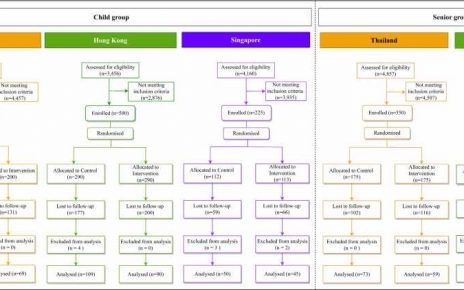
- Attention deficit/hyperactivity disorder in adulthood may be associated with an increased risk of dementia, according to a new study.
- There is some overlap in the symptoms of the condition and dementia, making their relationship less clear.
- The study suggests further investigation of ADHD in adults, as well as its association with dementia.
Having attention-deficit/hyperactivity disorder (ADHD) as an adult is associated with an increased risk of dementia, according to a new study.
After researchers adjusted for 18 possible confounding factors, they found that adults with ADHD have a 2.77-fold increased risk of dementia compared to people without ADHD.
The study is based on health records for 109,218 members of a nonprofit Israeli health maintenance organization, Meuhedet Healthcare Services. The participants were born between 1933 and 1952 and entered a prospective birth cohort study on January 1, 2003 — they were ages 51–70 years at that time. None had an ADHD or dementia diagnosis.
They were followed until February 28, 2020, during which time, 730 participants received a diagnosis of ADHD, and 7,726 a diagnosis of dementia.
The study also found that for people with ADHD who received psychostimulant medications prescribed for the condition, there was no increased risk of dementia. This suggests that treating ADHD may help lower the increased risk for dementia.
The study is published in JAMA Network Open.
How adult ADHD is different
Symptoms of ADHD differ slightly in adulthood than in children, and there is some disagreement over whether adult ADHD is a condition of its own or a carryover from childhood.
According to the study, “evidence supports the concept of [adult-onset ADHD].” The authors say that adults who have had the condition since childhood constitute just 3% of adult ADHD cases and that adult ADHD presents “different social, psychological, and genetic profiles.
Dr. Brandy L. Callahan, assistant professor in the Department of Psychology at the University of Calgary, who was not involved in the study and has previously studied ADHD in adults, does not agree.
“ADHD is a neurodevelopmental condition which, as currently defined, means it must begin in childhood. The authors of the new study [a]llude to ‘adult-onset’ ADHD, but this has been largely debunked,” Dr. Callahan told Medical News Today.
Dr. Angel Golimstok, neurologist at the Hospital Italiano de Buenos Aires, who was also not involved in the study, explained:
“As a patient with adult ADHD ages and experiences cognitive decline due to natural aging, the symptoms of deterioration are more pronounced than in those without ADHD. This is because the compensation of a good memory or better verbal fluency for the ADHD experienced in younger years has been lost.”
ADHD in adulthood vs. dementia
“In contrast,” said Dr. Callahan, “dementia is a neurodegenerative condition, meaning it is a result of a decline/change in brain health that was previously [healthy].”
“[ADHD] is not a progressive condition, unlike MCI [mild cognitive impairment] or dementia,” Dr. Golimstok told MNT. “It does not impact daily living activities to the same extent as dementia and to a lesser degree, MCI.”
Specializing in dementia, Dr. Sara Becker, postdoctoral associate at the University of Calgary, who was not involved in the study, added, “While both disorders present with cognitive deficits, especially in the areas of attention — inattentiveness, difficulty sustaining or dividing attention — their presentation and timing is different.”
ADHD as a risk factor for dementia
Whether ADHD is adult-onset or not, its association with dementia remains to be explained.
Dr. Callahan noted that “some experts have suggested genetic factors in ADHD may increase susceptibility to later-life dementia — for example, relating to dopamine signaling.”
Dr. Becker highlighted that “[I]t is not symptoms of ADHD, per se, that increase [the] risk of dementia, but more factors associated with having ADHD.”
She cited “a landmark” 2020 study by the Lancet Commission that identified twelve modifiable risk factors associated with the development of dementia. Adult ADHD is associated with some of these.
Dr. Becker presented some examples. Low educational attainment is a risk factor for dementia associated with people who have ADHD. In addition, she noted that depression—another dementia risk factor—often accompanies ADHD in adults.
“Lastly, people with ADHD are also more likely to smoke, have high blood pressure, or be classified as obese, all of which are factors that increase dementia risk by worsening their vascular health,” she pointed out.
Dr. Callahan noted that her team is currently investigating this connection.
Do ADHD medications affect dementia risk?
Other experts have suggested that ADHD medications may increase dementia risk, although the current study finds otherwise, said Dr. Callahan.
The study’s lead author, Dr. Stephen Z. Levine, pointed out, “There is no approved ADHD medication for dementia; any such practice would be off-label… and not evidence-based.”
“Studies are warranted to validate such a practice because of the possible benefits and harms (e.g., cardiovascular risks) that may be associated with prescribing ADHD medications for dementia,” he told MNT.
How does ADHD affect dementia risk?
According to the authors of the study, previous investigations of adult ADHD and dementia have been inconclusive and inconsistent, and they intended to resolve some of the many lingering questions.
Dr. Golimstok lauded the new study’s large sample size and long follow-up time, saying it does further confirm the connection between adult ADHD and dementia.
However, he expressed concern that the study did not identify the symptoms of ADHD that are associated with dementia.
“The study does not clarify the type of dementia associated with ADHD, nor can it determine whether ADHD in adults is a risk factor or part of an extended prodromal [preliminary] phase of the degenerative disease.”
— Dr. Angel Golimstok
Dr. Becker described the study as “a great step toward examining, in particular, the different factors associated with ADHD that increase their risk of dementia.”
“By incorporating a large number of covariates (which have been overlooked in a few research studies) we become more able to clearly see the direct effect of ADHD on dementia risk,” she said.
“This study helps to clarify that the association is not always black and white, but that we need more research to examine, for example, sex differences or differences in types of dementia (early onset versus late onset), and clarify whether there might be specific risk factors that can (possibly) define one at-risk group of people with ADHD,” Dr. Becker added.
Source: Read Full Article



